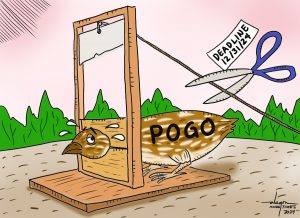We believe that there are some things that the Board of Directors of the Davao City Water District (DCWD) should thresh out with the water firm’s management team or with the officials of its partner in the Bulk Water Delivery System – the Apo Agua. The Board can also opt to discuss the matter together with its management and that of its partner.
We are raising this unsolicited suggestion because of the prevalence of areas in Davao City that lately suffered water service interruptions. The announcements made through the social media, specifically the ones text-blasted in the consumers’ mobile phones will back us up on this.
Some examples are several barangays served by either the Riverside Water System (RWS) or the Talandang Warter Reservoir located in Biao Joaquin. Since April 24 up to the present these areas experience water service outages for a number of times. Last April 24 up to May 6, 2024 the interruptions happened daily from as early as 7 in the morning up to as late as 10 in the evening. The water comes back from that hour until the morning (7 am) the next day.
Then there was a respite for two days, after which the service was normal again. Yesterday starting at about 6 am the water was again gone from the consumers’ faucets (including ours of course). In all of the 13 days and the succeeding 2 day outages we were told by the DCWD information unit that there were leakages in the newly installed pipes.
Honestly, while we have some doubts as to the full veracity of the reason given, we still leave rooms for consideration. After all, if the loss of water in the consumers’ households is a problem among residents, the reason of the outage could be even a bigger problem for the water agency.
Again, if we have to zero in on the leakages of pipes the DCWD or the Apo Agua will be spending more to repair the installation or even change the busted pipes. That would be additional overhead not just on the pipes but also on labor cost for the repair.
That is why we feel there is need for the Board and the management teams of both the DCWD and its partner to sit down and discuss the matter. They have to know what is causing all the leaks and whose facilities these are happening.
There are two areas that the executives of the partners could possibly look into. First is the quality of the pipes that are used for the water distribution. The second is the quality of the labor that the workers on the pipe-laying project are capable of doing.
If the executives will be able to determine that the cause of the leaks and busting of pipes is the poor quality of materials used in the manufacture of the pipes, then the water firm’s or its partner’s officials should call the attention of their suppliers of pipes or, if necessary, look for new ones whose products meet the quality requirement.
If it is the second area that is wanting then the DCWD or Apo Agua should better be strict on its monitoring of the work output of their hired contractor/s. If those who are tasked to work on the pipe-laying and connecting are organic in their organization, the DCWD or Apo Agua should better be strict in their parameters for accepting the work completion.
We are no engineer but the problem of pipe leakages or busting can easily qualify to be within the province of “common sense.” But if the managements of either or both partners in the water distribution business are complacent and unmindful of issues more often complained of by the consumers then we cannot fault if some consumers would think that improving the water delivery service is only secondary among objectives
We can only hope that the much improved dealing of DCWD’s front liners especially those working in the offices will be matched by the level of service in the operations level. If not, then all efforts in coming up with programs and strategies to attain consumer-friendly behavior will result to naught.


